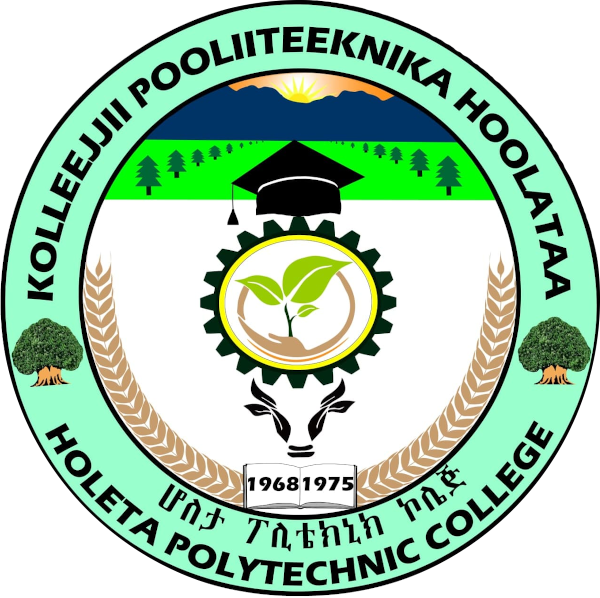Holeta Polytechnic College (HPC) is a government owned college established in 1975 in Oromia Regional State. It is located at a distance of about 30km from Addis Ababa, the capital city of Ethiopia on the way to Ambo road. The college was established as Holata Agricultural Training Center to train farmers in short term training from a couple of weeks to six months. In addition to giving training to farmers, the center was also serving as professional improvement centers for the development agents.

The training center was also used as technology center that provide improved dairy cows for other agricultural training centers. From 1975 to 1993, the center offered different types of training that include home economics, vegetable production, field crops production, pest control, animal health care, animal breeding, agricultural cooperative, book keeping, soil and water conservation. During this period, the center graduated about 6,954 trainees in the aforementioned fields,
In 1994, the agricultural training was interrupted and the center was mandated to train rural road technicians which lasted only for three years. Starting from 1997, the center was used to provide a 9 months training to development agents (DAs). The college served this purpose until 2000 with the enrollment capacity of 80-120 trainees. During this period, the center contributed 999 graduates to the world of work.
In 2001, following the government decision to increase the number of middle level agricultural practitioners (extension workers) to improve agricultural production and productivity, the center was upgraded to Holeta Agricultural TVET College and started to train in two fields of agriculture namely: Animal Science and Plant Science. One of the important departments, Natural Resources Department, was established in 2002. Middle level agricultural practitioner training was an input based training system whereby the trainees were selected from different regions and were assigned to the college by Ministry of Agriculture. This input training system was lasted until July 2010 and during this time about 2,655 middle level agricultural practitioners at diploma level (10+3) were graduated from the College.
In line with 2008 National TVET Strategy of Ethiopia, input based training system was replaced by outcome based training system that relies on labor market demand. Based on labor market, new Ethiopian Occupational Standard (EOS) took over the input system of training with the aim to train agricultural entrepreneurs instead of agricultural extension workers. Our college started implementing this strategy since 2009/2010 education and training calendar. The training modality has been started to be delivered in level based and being continued from level I-V. Stating from 2011 the college was also mandated to deliver industry extension services for Micro and Small Enterprises (SMEs) as stipulated in National Ethiopian TVET Strategy of 2008. Accordingly, the college has currently two thematic areas namely: delivering quality outcome based education and training and technological transfer and technical support for MSEs.
In response to the needs of the labor market, new occupations such as Animal Health, Information Communication Technology, Building Electrical Installation and General Metal Fabrication and Assembly (currently called Mechanics) were commenced to be delivered in the College stating from 2013.
Due to its contentious efforts, the College was upgraded to Holeta Polytechnic College in 2018. Following its upgrading to Polytechnic, the college was selected by Federal TVET Institute as one of the satellite campus to train the TVET trainers at BSc level in the occupations of Agro- processing and Agriculture technologies. Since its establishment the college contributed more than 21,522 graduates in various agricultural, Agro-processing and nonagricultural occupations to the world of work in short and long term training.
Currently, the College is working to become the best College in delivering market oriented and gender sensitive quality training based on EOS. To maintain quality training, student-centered and practical oriented education and training is now becoming our focus. Furthermore, the college is working with donors like the World Bank and KFW to become center of excellence in Agro-processing and one of the leading flagship TVET institutes in East Africa. The college is also working strongly to become one of the centers for international students and doing its best to admit international students to its short term and long term programs. Furthermore, HPC is working hard to collaborate with different East African institutions to enhance staff exchange and promote knowledge and skill transfer across the region.
Holeta Polytechnic College (HPC) is a government-owned college which was established in 1975. HPC is located at a distance of 30km from the capital city on the way to Ambo. Initially, the College was engaged in producing a significant number of middle and lower-level agricultural practitioners with the aim of providing technical support for the farmers in the country. Nowadays, the college is providing trainings based on the need of labor market and known as one of the leading Technical, Vocational, Education and Training (TVET) institutions for training skilled technicians in the agricultural sector.

To become a well-equipped international training center that serves the needs of stakeholders in the Agro-processing industry.
Holeta Polytechnic College is to be a Center of Excellence in Agro- processing in the East Africa that produces skilled, smart, creative and employable work force through acquiring and adapting modern technologies.
to deliver quality outcome-based training to supply competent, motivated and innovative middle and low-level workforce with the necessary technological skills to ensure the implementation of an agriculture-led industrial economy of Ethiopia